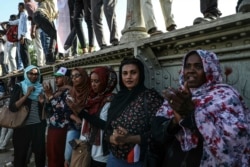Activists are calling on Sudan's military and opposition leaders to open the country’s political process to women when the sides begin to implement their recent power-sharing deal.
For most of Sudan's 63 years as an independent country, women were not allowed to get involved in politics due to cultural norms and other restrictions.
Women say they have been marginalized and denied a chance to participate in public affairs, especially during the 30-year regime of former president Omar al-Bashir.
Women’s rights activist Manal Bashir, who helped mobilize women during the protests that led to last week's power-sharing deal, says now is the time for women to speak up for their rights.
“We had been oppressed, discriminated within our homes, at the regulations even so we found ourselves lacking behind and we were aware about this status. So, we didn’t leave this status behind but we worked a lot to achieve the change in our lives,” Bashir told VOA's South Sudan in Focus.
Activist Naimat Abubaker Mohammed says under Bashir’s rule, women were afraid to speak up because the environment was not safe for anyone, male or female, to be active in opposition parties.
“If you are a politician that means you will expect that you will go to prison, you will be detained for a long time, you will can be fired from your job,” Abubaker said.
Sudanese journalist Mashaeir Ahmed says women played a key role in overthrowing President Bashir.
“They have been working as a coalition demanding real change. They want to surface as women leaders in the society, even though this will be against some cultures, but women have decided not to be behind again,” Ahmed told South Sudan in Focus.
The proposed power-sharing deal between the Transitional Military Council and the opposition stipulates that women should hold at least 40 percent of the country’s national legislative seats.
While embracing the move, Abubaker fears there may not be enough qualified women to fill that number of seats.
“It is good that the agreement mentions some percentage for women, be it 30 percent or 40 percent, so there is good signal that women will be given a quota, but it is important to fill this quota with quality representation,” Abubaker told VOA.
Abubaker insists the Sudanese revolution has opened a new era and women should see the political change very soon.
“It has opened the country for democracy, rule law, justice and all these for the benefit of women. So if we really start this long journey to democracy, I am sure women’s position in general will be change,” said Abubaker.
Women activists are calling on the Transitional Military Council and the opposition to sign the power sharing deal soon.
Opposition and military leaders said more than a week ago that they agreed to a civilian-led government but have yet to sign the agreement.





